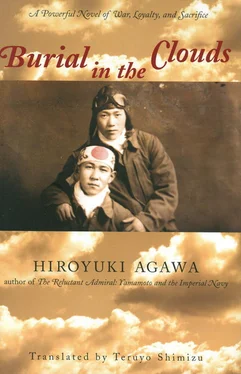Mr. N. reports in his letter that he will be participating in “rites of purification” and other such things at the Training Center for Doctrine in Koganei-cho, Kita-tama, Tokyo, through February 9. I hardly know what to think about that. He says each high school is to send one teacher to study these rites, but I have to wonder: Could this sort of thing possibly help usher in a new era? Is it really worth the bother? Or is it just useless folly, like rowing against the current? If you ask me, instead of abandoning their vocation for “rites of purification,” I would much prefer that teachers and students put their hearts into their studies just as they did before the war—no, even more diligently than they did before the war, so as to make up for our absence. I hear that the professors’ offices at the university are all desolate. Letters trail in to them, one by one, from students who joined the army and wound up in some transport unit in Fushimi, in some regiment in Takahata, Nara, or in scattered places such as Kagoshima, Tokyo, or Manchuria.
Well, it happened, exactly as I feared it would. Some student in the 217th Division got off a wisecrack. “You see,” he said to a drill instructor decorated with four good conduct medals—to the guardian spirit of the navy, so to speak—“You see, I’ll take good care of you when I receive my commission. So why don’t we meet each other halfway? You know, give-and-take.” As a result, everyone in the 217th was ordered this evening to do push-ups with their feet up on chairs, almost in the position of a handstand. And while they were at it, they got a good “dive-bombing” in the bargain (that’s when an officer gathers all his momentum and thrashes you on the ass). Next, they were doused with cold water from the washtub. Their strength was utterly depleted. Men whose brittle arms could no longer support the weight of their bodies were forced to lick the water off the deck. My heart ached when I heard how severe this correction was, but I’d better not quail at it. They say that in the army much worse punishments (and far more unreasonable ones, too) are a matter of course. I can’t pamper myself or give in to conceit. I must come to grips with the realities of military life. This incident happened in another division, but I have to learn from it nonetheless.
Smoking alone at night, I gazed up at Sirius, its bright light flaring off the lower left side of Orion.
Today, a series of military reviews.
Received visitors after that. Father and mother came to see me. My father said the train was so packed that they had to stand all the way from Osaka. Mother had sunken eyes. The two hours given to us, from twelve to fourteen hundred hours, passed all too quickly. I forgot myself, and now I have no clear memory either of what I heard or what I said. It seems I just repeated such commonplaces as “I’m all right,” “I’m trying my best,” or “I don’t find things so difficult,” all the while feeling embarrassed as my mother gazed at me in my sailor suit, half in admiration, half in pity. My parents told me that my brother Bunkichi has been transferred to a newly organized unit that set out from the port of Osaka on the 8th. He is now a corporal. Still, he was allowed to spend some four hours at home before departing. “Today may be the last time I see you in this life,” he told our parents, looking very sad. As he was wearing a summer outfit, my parents speculate that he will be sent to some island in the Pacific. I don’t worry so much about my own situation, but I really am anxious when it comes to my brother. He is timid, has a weak constitution, and was drafted at the age of thirty-four. My mother grumbled that she didn’t know who would inherit the family business. “Don’t bring up an issue like that,” I chided her. “How could I possibly make an answer now?” Nevertheless, I grew quite emotional when I heard that Professor E. said to them, “Please tell him to take good care of himself,” and also when my father said, “We’ll come see you anywhere, whenever they allow us a meeting.”
The reception room is located to the right of the gate to the naval barracks. It was a lovely day, sunny and warm, and it made me wistful to think that we were forbidden to eat anything. I saw many a regretful face scattered about, gazing at what must have been big bundles of botamochi, or sushi, or red rice. “Father and I can cover for you. No one will see. Why don’t you try some?” said one young mother, almost pleading. Her eyes misted up when her son replied in a whisper, but still maintaining his military bearing, “No, it is not permitted.” Filial devotion is a blessing, but it can also be ticklish, and in our case that devotion might well turn out to be a burden at times.
Anyway, what ingenuity Fujikura possesses! When the meeting ended, his gaiters were all puffed out and gawky. And after the inspection, two satsuma oranges materialized in my hammock. I felt guilty indulging my appetite when my friend had borne all the risk (I never got my hands dirty). But I accepted the gift with gratitude.
The commander of the naval barracks has changed. Rear admiral Takaaki Kamai just arrived to fill the post. We saw off his predecessor, waving our caps.
There was a dress inspection this afternoon, followed by the drills in which we sling and fold up our hammocks as quickly as possible. Very tough.
About a week ago, I wrote in this diary that devoting myself entirely to the navy would only deepen my appreciation of literature, should I survive the war. Then it occurred to me that this way of thinking—that is, treating navy life as a means to a strictly private end—not only contradicts the idea of “devoting myself to the navy,” it also suggests that I am anything but prepared to endure an ordeal that will carry us beyond our physical and mental limits. At the end of the day, when I take a hard, honest look at myself, I see how desperately I wish to live through the war and return to private life. It horrifies me to call to mind what Officer Yoshimi told us in the cutter on that snowy day a while ago. I loved the literary vocation to which I had aspired, loved it completely. Good friends, good professors, tranquil offices, and beautiful poems. No doubt it had its sentimental side, but I studied with all my heart. I sowed and watered the soil, and I have harvested nothing yet. I can’t bear to think that I may close my life of twenty-three years and several months without harvesting a single crop in what I believed to be my true calling. Perhaps I just lack the good grace to give it all up.
Yesterday we ran races in full battle gear, then had a tea party in the afternoon. After the tea, the results of the Student Reserve Officers Examinations were announced, and, as I expected, I have been assigned to the aviation branch, and will be sent to the Tsuchiura Naval Air Station in Ibaraki Prefecture. It never occurred to me a year ago that I would become a navy flyer.
Law graduates like Yonemura and Yoshizawa will go to the Naval Paymaster’s College in Tukiji, Tokyo. Kashima has been assigned to the seaman branch and will head forTakeyama Naval Barracks in Yokosuka, Kanagawa. My Tsuchiura group is to be the last to depart, so we spent a busy afternoon packing lunches for Kashima and his fellow seamen. The bamboo husks we used to wrap the food in were small, but we had no good alternative. Anyhow, we kept struggling at the task. We took the greatest possible care we could, out of respect.
At one-forty, in the middle of the night, the Yokosuka group folded their hammocks and left the barracks en masse. Will the day come, I wondered, when we meet again under that blue oak tree, as Kashima said in his poem, given that we can’t assume we shall live even to see tomorrow? Following navy custom, we simply raised our hands in salute and waved our caps, without shaking hands or patting each other on the shoulders. A lump rose in my throat, but with no opportunity to speak to Kashima, I just continuously saw the men off as they marched in their long line across the dark wintry grounds, all in their identical seaman’s uniform. With some of these men, I had kicked a ball about on the field, sung, and debated philosophy, until just two months ago. I will probably never see them again.
Читать дальше












